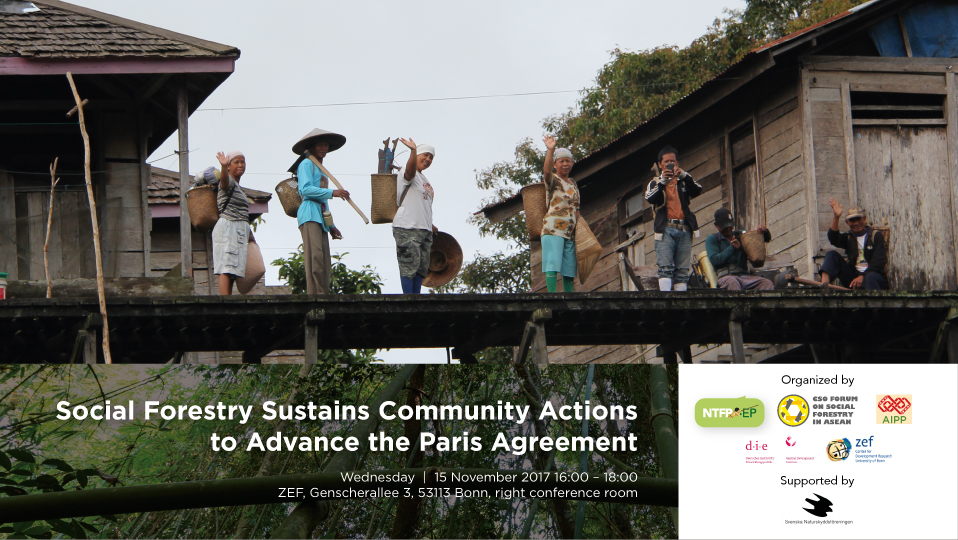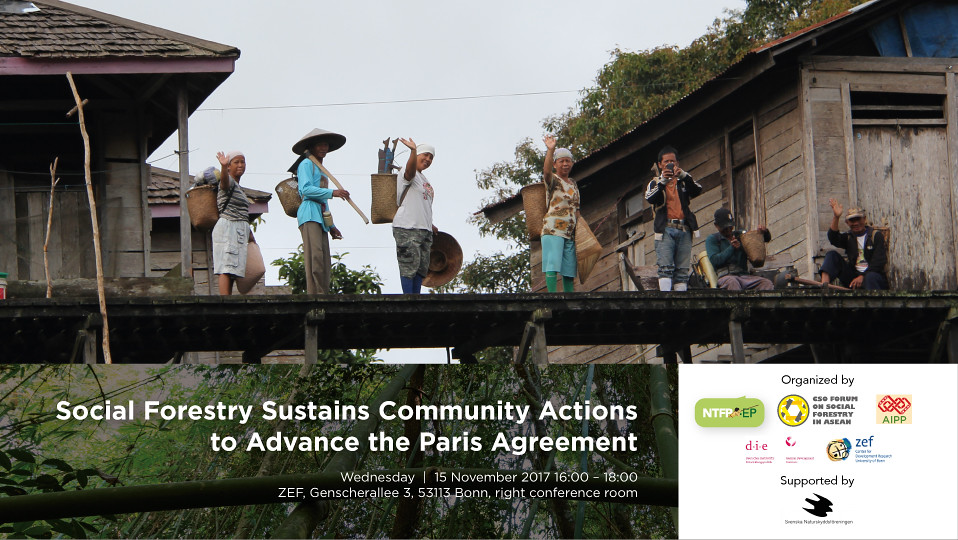BONN, Germany – Indigenous peoples and local communities have long managed forests in social forestry systems where working models of inclusive land use planning, sustainable and diversified livelihoods, equitable benefit sharing, and customary governance bring real and long-term benefits for conservation, reducing emissions and over-all development that are culturally appropriate. It is a wealth of knowledge developed and practiced by communities over the years across forest landscapes in Asia. These local actions and knowledge, if recognized, included, aligned or linked and supported by international agreement such as the Paris Agreement will contribute to the temperature and resiliency targets aimed under the Paris Agreement.
At the country level, these CSOs and indigenous organizations together with community’s work towards recognition and inclusion of these actions in policies, programs that support mitigation and adaptation within existing development and climate change plans. The growing body of evidence and demonstrated results suggest that making social forestry integral in this climate change plans such as NDCs, and NAPS can enhance its relevance and effectiveness and ultimately benefit forest-dependent communities.
Main Objective:
Share experiences and lessons learned in the national and regional (ASEAN) level on how local policies, practices and actions using social forestry as an approach can contribute to the Paris Agreement
Key Messages
- Experiences, innovations and lessons learned by CSOs and Indigenous Peoples Organizations working on sustainable forest management, promotion of traditional ecological knowledge, sustainable non-timber forest enterprises and safeguarding community, biodiversity and carbon in REDD+ implementation;
- Social forestry models and platforms in Asia have contributed to improving community resilience to climate change, providing livelihood and ensuring food security
- Community-based initiatives, policies, practices and using social forestry as an approach contribute to the goals of the Paris Agreement and the SDGs
- Incentives to bolster effectiveness in social forestry and climate change implementation towards achieving equitable climate and co-benefit outcomes.
Session Contribution to the COP 23 Agenda
This session aims contribute in the Agenda 13 [1]on Local communities and indigenous people’s platform (Provisional agenda of the Subsidiary Body for Scientific and Technological Advice Forty-seventh session, November 6-15, 2017).
The Paris Agreement itself welcomes this discussion and “Recognizes the need to strengthen knowledge, technologies, practices and efforts of local communities and indigenous peoples related to addressing and responding to climate change” and will establish a platform for the exchange of experiences and sharing of best practices on mitigation and adaptation in a holistic and integrated manner.
Session Flow
This will be an interactive, talkshow style session for 1.5-2 hours, moderated presentation with open forum. There will be 4 speakers who will share experiences on the following topics/ areas:
- The regional (ASEAN) Working Group on Social Forestry and Climate Change and national multi-sectoral platforms such as the Philippine Working Group on Community Based Forest Management (CBFM) and the Cambodian National Community Forestry Program Coordination Committee;
- Traditional Ecological Knowledge of Indigenous Peoples in Sustainable forest management (such as shifting cultivation, etc.) and sustainable harvesting of non-timber forest products (for crafts, fashion, beauty and nutrition);
- Progress on REDD+ Implementation in Select Asian Countries, (work on Safeguards as requirement under the Warsaw Framework on REDD+, carbon and non-carbon benefits etc.)
Agenda
| Time | Topic area/theme | Resource Speaker |
16:00 – 16:20 |
Social Forestry, Climate Change and the NDCs |
Ms. Edna Maguigad
|
16:20 – 16:40 |
The regional (ASEAN) Working Group on Social Forestry and Climate Change and national multi-sectoral platforms such as the Philippine Working Group on Community Based Forest Management (CBFM) and the Cambodian National Community Forestry Program Coordination Committee |
Representative
|
16:40 – 17:00 |
Traditional Ecological Knowledge of Indigenous Peoples in Sustainable forest management: Shifting
|
Mr. Kittisak Rattanakrajangsri
|
17:00 – 17:20 |
Indigenous Women and Natural Resource ManagementAdvancing implementation of REDD+ using social forestry approaches |
Ms. Mai Thin Yu Mon
|
17:20 – 17:50 |
Platforms for indigenous peoples and local communities at the regional and national levels |
Dazzle Labapis
|
17:50 – 18:00 |
Summary and Synthesis |
Representative
|
[1] http://unfccc.int/resource/docs/2017/sbsta/eng/06.pdf
Date/Time: Wednesday, 15 November 2017/16:00 – 18:00
Venue/Room: ZEF, Genscherallee 3, 53113 Bonn, right conference room
An interactive session co-organized by:
Non-Timber Forest Product Exchange Program (NTFP-EP) Asia, CSO Forum on Social Forestry in ASEAN, the Asia Indigenous Peoples’ Pact (AIPP), German Development Institute / Deutsches Institut für Entwicklungspolitik (DIE), and the Center for Development Research, University of Bonn.
Supported by: Swedish Society for Nature Conservation





